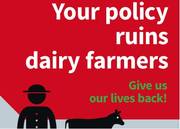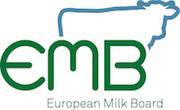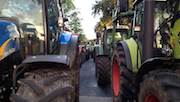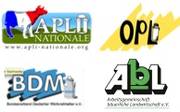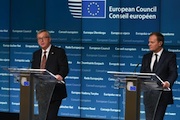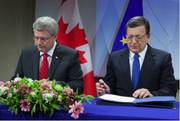EMB Newsletter August 2015
- Call for action - Big demonstration on 7 September
- Press release: Protests all over Europe show desperate situation of dairy farmers
- Milk protests in Europe – summary of campaigns in the countries
- Statement of French and German milk producers
- Transatlantic free trade and the end of milk quotas: Europe will lose substantially!
- Canada: Supply management under attack
Newsletter as PDF
Contact
EMB - European Milk Board asbl
Rue de la Loi 155
B-1040 Bruxelles
Phone: +32 - 2808 - 1935
Fax: +32 - 2808 - 8265
Dear dairy farmers and interested parties,
It seems like milk prices in the EU have entered a never-ending downward spiral. It has resulted in prices below 25 cents/litre being reported from many countries. Asking whether it is possible for dairy farmers to even survive in this context is therefore very pertinent. If you keep in mind that producing a litre of milk costs much more than 40 cents, then it is clear that NO is the only possible answer to this question. This disastrous state of prices has pushed producers all over Europe to take to the streets in massive protests. Policy makers have reacted by convening an extraordinary meeting of the Agriculture Council on September 7 in Brussels. On this day, the EMB and its producers will also be at the scene with a large-scale action!
Fact: The end of milk quotas led to surplus production, which has destroyed prices. The promise of an amazing new export strategy that would allow surplus milk to be effortlessly soaked up by global markets has not become a reality and the slack EU safety net would probably collapse under the weight of a single feather. It is a fact as well, that the sharp drop in milk prices in Switzerland, where milk quotas were phased out back in 2009, was a clear example of where the EU would be headed as well.
You could criticise policy makers, industry and the many producer representatives, who should have predicted this development long before April 1, 2015 - the day the quotas ended. This is a valid argument and not without merit. Alternatively, we could stop complaining and reach out to all stakeholders of the dairy sector instead, urging them to learn from their mistakes and to come up with a prompt, long-term common solution. A solution that will lead the sector out of this crisis.
The EMB wishes to focus on this second option and look constructively towards the future. We believe that it has slowly become clear to one and all that we need an effective crisis management programme in Europe. The Market Responsibility Programme (MRP) proposal is on the table. We - producers, policy makers and industry - need to discuss it together, frankly and honestly. There is no need to be afraid, it does not bite!
In our August newsletter, you will find more information about the action on September 7 in Brussels and on the protests of dairy farmers across Europe. It also talks about the risks posed by the trade agreements between the EU and Canada (CETA) as also the EU and the USA (TTIP).
I wish you an interesting read!
Silvia Däberitz, EMB Manager
Call for action - Big demonstration on 7 September
Big EMB demonstration on 7 September in the morning to coincide with EU Ministers of Agriculture meeting in Brussels
Europe is drowning in milk, and milk prices are driving us farmers to ruin!
Fellow milk producers,
The situation is now drastic for all of us. Milk prices are rock-bottom; dairy farmers are being brutally deprived of their livelihood throughout Europe.
The politicians are ruining dairy farmers
The politicians, too, have now grasped that the milk market is in a total mess and the whole of Europe is up in arms. The Ministers of Agriculture of the 28 EU member states have convened an extraordinary Council meeting for 7 September in Brussels to discuss solutions for the dairy sector.
Yet to prevent the outcome being just empty words and for the Ministers of Agriculture to now finally adopt the solutions urgently required for the milk market, the dairy farmers of Europe must make themselves heard in Brussels.
Our demands:
- Cost-covering milk prices and our crisis instrument, the Market Responsibility Programme (MRP), now!
- The money raised from the super levy must immediately fund voluntary production cuts to reduce the volume of milk!
A big demonstration is planned outside the building in which the Ministers of Agriculture will be meeting. The idea is for dairy farmers from all over Europe and loads of tractors to give the ministers a graphic lasting reminder of the atrocious results of their milk policy.
The ball is now in the politicians’ court! The more dairy farmers that turn up in Brussels in the morning of 7 September, the more evident it will be that European milk producers are united and that the politicians must act now.
We need you in Brussels on 7 September! Stand shoulder to shoulder with your fellow farmers from other countries and demand an end to this destructive milk policy!
Details of demonstration on 7 September:
- Meet in the morning at Justus Lipsius building (Rue de la Loi 175, B-1048 Brussels)
- Big demonstration starts about 11:30 hours
- More detailed information to follow shortly!
Press release: Protests all over Europe show desperate situation of dairy farmers
Please find here our current press release
(Brussels, 30.07.2015) Dairy farmers’ protests are flaring up all over Europe. In France, Spain, Belgium, Portugal and Germany, everywhere you look, extremely low milk prices – in some cases about 25 cents a litre – are forcing producers out onto the streets.
The intolerable situation was triggered off by a milk policy banking on exports and overproduction. Sieta van Keimpema, Vice-President of the European Milk Board (EMB), says: “The current system and the current policy have failed, plunging European dairy farmers into the abyss.”
But if this failed policy of an unlimited increase of production is only countered by half-baked concepts, no end will be put to this misery. It will merely deceive the general public and producers in the short term with what may appear as a solution. Such dubious proposals include an increase of the intervention price without concomitant cuts in production, questionable price agreements as well as unrealistic export strategies.
What is the problem?
Why is it not possible to achieve a cost-covering price in the market, which would enable dairy farmers to survive and also invest in future production? The volume produced in the market exceeds demand. And too high volumes force prices down to rock-bottom. “It is the same in every EU country”, says Sieta van Keimpema. “Putting the blame on individual countries or farmers is wrong, because they are all struggling with the same problem”. Those steering this blame strategy are only distracting from the real problem and showing how little they care about a serious solution.
What is the solution?
When excess volumes cause the price to collapse, we need to adapt EU production, in order to do something to counter the threat to dairy farmers’ livelihoods throughout Europe. Reducing the volume in times of crisis takes the pressure off the markets and makes for higher prices.
As producers would not cut their production individually, this must be done on the level of solidarity, using a crisis instrument like the Market Responsibility Programme (MRP). This then ensures that the reduction is fairly distributed among producers. In the end, every producer benefits from the fair prices this achieves.
What is of no use and only distracts from the real problem?
Artificially propping up the price would only stimulate production and make the situation worse. That is why proposals like raising the intervention price without reducing volumes at the same time are counterproductive. Also merely banking on exports to flood other markets with excess production is no good. For they too already have a lot of milk, and the international price war this entails lowers prices for everyone. Additional overproduction from the EU further hastens the downward price spiral. Sieta van Keimpema summarises the EMB’s demands: “If the problem cannot be shifted, there is only one solution: the EU has to do its homework and overhaul the current system, thus eliminating the plight in the long term.”
Moreover, one-off campaigns such in France, where a price rise from below 30 cents to 34 cents a litre of milk was agreed – yet ignoring the market situation –, are only superficial solutions.
Only if the EU Commission, Council and Parliament put a crisis mechanism in place that focuses on volumes, market conditions can be created that allow producers to be paid a fair price. At the extraordinary Council meeting on the current milk price crisis, which will be held on 7 September, important signals will have to be sent and the way will need to be paved for long-term solutions.
You can find out more about the crisis instrument for the milk market – the Market Responsibility Programme (MRP) – here:
Silvia Däberitz, EMB
Milk protests in Europe – summary of campaigns in the countries
The desolate situation on the milk market is causing protests to flare up all over Europe. You will find here a review of important milk farmers' campaigns of the last weeks.
Reports from August 7
France: According to reports published by agra-europe on 6.08., in the run-up to the special Council meeting on 7 September French Minister of Agriculture Le Foll is pressing for concrete decisions on mitigating the current crisis situation. At present, France is working on proposals for supporting the markets and is aiming at acquiring majority backing for his proposals by 7 September. Le Foll had previously caused irritation because he had openly championed a price support for French dairy products to the detriment of imports.
Spain: On 5 August, a meeting was held in Santiago de Compostela (Galicia, northern Spain) between dairy farmers, the Ministry of Agriculture and regional politicians. The dairy farmers found the meeting unsatisfactory. On 6 August, there was a second large demonstration in Chantada (Galicia) involving some 500 tractors and about 2,000 dairy farmers. The dairy farmers in Galicia are calling for at least 30 cents for a litre of milk. At the moment they are being paid between 26 and 27 cents, some are even receiving less than 20 cents.
Germany: In an open letter of 6 August, the MEG Milch Board severely criticised German Minister of Agriculture Schmidt’s export drive. In his interview with “Die Welt” the minister had specified new export markets in the Near East (Iran) and China as an option for the growing milk production, and stated his support for boosting exports.
Interview with Minister of Agriculture Schmidt in Die WELT on 02.08.2015 (in German)
Belgium: MIG press release on the current situation in Belgium and measures in the dairy sector (in French or Dutch)
Demonstrations: Big EMB demonstration in Brussels (7 September) and big D19-20 Alliance demonstration in Brussels (6 September).
Great Britain: In the United Kingdom, dairy farmers are continuing to protest outside distribution centres and in supermarkets after the three biggest dairies – Arla, First Milk and Dairy Crest – announced milk price cuts last weekend. The dairy farmers are appealing to consumers to boycott supermarkets practising an unfair price policy.
Lithuania: Lithuanian dairy farmers are still facing a tough situation. On average, prices are around the 18-20 cents mark, with a piffling 10 cents being paid for so-called “surplus milk”. The Lithuanian milk producer organisation LPGA is demanding regulatory instruments for the milk market and calling on the Lithuanian government to guarantee fair trade practices in the dairy sector and fair prices for dairy farmers.
Reports from August 5
EMB: On August 4, an extraordinary EMB meeting took place with participants from Belgium (MIG and FMB), Germany (AbL and BDM), France (OPL), Ireland (ICSMA), Lithuania (LOSP), Luxembourg (LDB), Netherlands (DDB and NMV) and Switzerland (Big-M). The discussion showed that the current situation all across Europe is unbearable. It was decided to organize, on the occasion of the extraordinary meeting of the EU council of ministers on agricultural affairs, an action in Brussels on the 7th of September, during the morning. It is also important to organize actions in the countries prior to that. Participants of the extraordinary meeting discussed details of the action. It is important that a high number of milk producers will be mobilized. Shortly, we will be sending you an official call for the demonstration with further details.
Germany: There are spontaneous demonstrations going on in Germany. The organisation for family farms AbL, for instance, has this information on a demonstration in East Frisia: "Yesterday evening 150 dairy farmers with 78 tractors held a spontaneous demonstration outside the ALDI central warehouse in Hesel, East Frisia. According to those taking part, they were joined by many young farmers and many others who had not been seen before at similar demonstrations or meetings. The idea to hold the demonstration came spontaneously from a few local members of the German Dairy Farmers’ Federation (BDM) and AbL Regional Chairman Ottmar Ilchmann. The idea then spread rapidly via "social media – and so the demonstration went viral."
Great Britain: Protests are to go ahead in Great Britain in the next few days. According to Farmers For Action, they are determined to make the general public aware of the problems through strong campaigns. It was now the British dairy industry’s turn. Moreover, the British Prime Minister had to finally realise who was running the country and who was in control of British food production. Not the politicians or producers, it appears, but the retailers instead. Campaigns in the UK include positive action like trolley challenges, in which shopping trolleys are packed with milk cartons. In some cases the producers buy this milk and give it away to shelters for the homeless etc.
Switzerland: In Switzerland they are following protests in the EU closely. Dairy farmers in the Big-M organisation are also critical of Switzerland’s role. Swiss representatives are said to have always presented the Swiss abolition of quotas in 2009 as positive to the EU. In fact, though, it had very negative consequences for Switzerland. In this way they are said to have deceived the EU and were partly to blame for “the mess” the EU is now in. See also an interesting Blick article (in German).
France: Farmers of the French Farmers’ Organisation Coordination Rurale held a rally with a tractor convoy yesterday, August 4 in the French city of Metz in order to call attention to their difficult situation. The farmers claimed the cancellation of the land tax (tax on undeveloped land).
More information under (in French): Le Républicain Lorrain and TV 19/20 of France 3 Lorraine, August 4 (3:20)
Reports from August 1:
Belgium: This Friday blockades were also carried out in Belgium for example in front of supermarkets of the chain Carrefour in Waterloo and in Bruges. As reaction to the protests of the last days, agricultural organizations, the processing industry and the retail met on Friday and agreed to work together in order to find measures until the end of August to support the sector. In return, the protests are to be suspended for a certain time. Here an image of the original document (in French)
On Thursday in Flanders and Wallonia farmers have strongly protested. Around 300 tractors blockaded highways. In Erpe-Mere (Flanders) protests took place in front of the supermarket ALDI and in Goé (Wallonia) farmers demonstrated in front of the dairy Corman. During the protests farmers have talked with the federal agricultural minister Willy Borsus. The farmers left the protest places during the night of Thursday and in the early morning of Friday.
On Thursday six Belgian agricultural organisations - among them also the EMB-organisation MIG and the conservative organisation Boerenbond - have published a joint declaration. It contains the will to search together for a solution in order to guarantee a cost covering milk price including a fair remuneration for labour. Here you see the declaration in Flemish and French.
France: On Thursday the French organisations APLI and OPL have published a joint statement together with the German dairy farmers´ organisations BDM and AbL. The statement stresses on the solidarity among farmers in France and Germany. According to the statement, they are supporting every action that points out the disastrous situation in the milk sector. Nevertheless they do not agree to any statements that are blaming the farmers of another country being responsible for the bad situation on the milk market. This joint statement is a reaction to the current protests in France on the frontiers to Germany, where French farmers had criticised German farmers by claiming they would support price dumping. Please see the joint statement in German and French here.
The president of the farmers organization Fédération Nationale des Syndicats d'Exploitants Agricoles (FNSEA), Xavier Beulin, has addressed a rather doubtful letter to French farmers. That provoked reactions from other farmers´ organizations and the public: Here you see the answer to the FNSEA letter from Bernard Lannes, farmer and president of Coordination Rurale (an umbrella organization, where also the EMB organization OPL - Organisation de Producers de Lait is a member) in French.
Germany: The organization Bundesverband Deutscher Milchviehhalter (BDM) is planning a nationwide week of campaigns, with a big event in Munich on 1 September. The federal teams of the BDM are coordinating currently a protest tour, passing many federal states in Germany. See more about the protest tour on the webpage of BDM (in German).
Farmers of the organization Bundesverband Deutscher Milchviehhalter (BDM) visited a dairy in the region of Mecklenburg-Vorpommern in Northeastern Germany to demand action in order to improve the milk price situation.
The German organisation "Arbeitsgemeinschaft bäuerliche Landwirtschaft“ (AbL) published a press release demanding the agricultural minister, Christian Schmidt, and the federal German ministers to take action in favor of a short term reduction of the milk volume. They are also demanding the installation of a crises instrument.
Great Britain: A convoy of tractors has blocked a highway in the region of West Midlands (Central England) on 24th July. Reason was the falling milk price in the UK.
Around 200 farmers from Northern Ireland were protesting with a tractor convoy in front of parliament buildings demanding politicians to take action against the „worst crisis of the Northern Irish history".
British dairy farmers brought their cows to the beach to communicate with consumers about bad milk prices. Pictures about the action on their Facebook site.
EU Commisison: EU financement of private stockage for butter and milk powder will be extended until February 2016 (old period of time: until 30th September 2015) Also the period for public intervention will be extended until the end of February 2016.
Reports from July 29
France: after ongoing protests with dairy blockages by farmers, last Friday it was agreed with the dairy industry that an average price of 34 cents / liter would be paid across the sector in 2015. The prices are currently below 30 cents / liter. Some protest events were aimed at neighboring countries. German trucks were observed at campaigns on the border, and German farmers were accused of driving price dumping. – The French member associations of the EMB, APLI and OPL, are distancing themselves from such campaigns, where the producers of other countries are held responsible for the problems. The organisations focus on joint solidarity campaigns for all milk producers in Europe, to find a solution to this European problem together. The problems are the same everywhere: due to the surplus of milk throughout Europe, the farmers are not receiving a fair price for their work. This affects all producers equally.
Belgium: at the opening of the agriculture trade fair in Libramont, at a campaign on Friday producers of the EMB member association MIG protested loudly, to get their views heard by the government. Then, talks took place with the Wallonian Minister-President and the Ministers of Agriculture of Wallonia and of the Federal State. The Belgian Prime Minister was also present. Agriculture Commissioner Hogan cancelled his trade fair visit at short notice, so that no meeting was possible with him. The MIG announced further campaigns. In a press release from July 27, the MIG also demanded an increase in the milk price, to the level that is currently agreed in France, to at least be able to cover bare production costs. For many Belgian producers, the milk price is currently still only on average 25 cents/kg. Here 2 videos about the event: video 1 video 2
Germany: on July 24 a protest by the producers of the AbL and the BDM-Team Lower Saxony took place in front of the offices of Deutsches Milchkontor (DMK), Germany’s largest dairy. Thereby, the producers criticized the focus on export production, although sales markets are lacking worldwide, and the resulting surplus production of dairy. In June, the producers of the DMK only received 27 cents/liter. Milk quantities must be reduced immediately, so that the prices can recover, according to the protesters.
Portugal: in Portugal the situation is extremely difficult, too, and the producers are protesting, among others at a campaign on July 15. Last year the milk prices fell by 25 %. As representatives from Portugal report, the sector is in the most difficult chapter of its history. Many producers still only receive an average milk price of 23 cents per liter. Here some photos of the protest.
Lithuania: sources report that Lithuania will be the first country to apply for intervention. Lithuania has offered almost 200 tons of skimmed milk powder (SMP) for public intervention. A further 500 tons should follow weekly, until at least the end of next month (in total approx. 2,700 tons). The price situation in the Baltic state is so fatal that they have to rely on this lowly support from the EU.
Silvia Däberitz, Regina Reiterer, Astrid Sauvage, EMB
Statement of French and German milk producers
Together for a systemic reform of the dairy sector
We, German and French milk producers, have been fighting together for many years for a stable dairy market and for our dignity as milk producers.
In this time, we have concluded time and again that the same problem persists: without an appropriate framework, it will be impossible for us milk producers - the first link in the production chain - to be paid fair prices. Therefore, we are fighting together for a crisis management system that is capable of taking early, preventive measures to restore the market balance when a crisis is on the horizon. We commend both the courage and strength shown by our colleagues in other countries, which is taking us all in small, but significant steps in the right direction.
There were surely many external attempts to set European farmers against each other, so as to divert their attention from the real issues at hand. This has also been the case in the recent actions in the French-German border region. We - APLI and OPL, the French EMB member associations, and BDM and AbL, the German EMB associations - welcome actions that highlight our miserable situation. However, we distance ourselves from comments that lay the blame on producers in other countries. We support common actions reflecting the solidarity of milk producers across Europe to come up with a common solution for this European problem.
Solidarity between German and French producers is strong. We are going to fight together and support each other! We would like to invite all our colleagues in Germany, France and other countries of Europe to participate actively in this fight. Anyone looking use this process to pit milk producers against each other is categorically uninvited!
Transatlantic free trade and the end of milk quotas: Europe will lose substantially!
Companies in the dairy sector seem to be celebrating the end of quotas and the upcoming EU-USA free trade agreement (TTIP) because it would allow them to gain even more export markets, while milk producers suffer and disappear in silence. However, agro-economist Jacques Berthelot and a report from the European Parliament say that we must be wary of such illusions.
Processors claim that with respect to dairy products, Europeans have more to gain than Americans through the TTIP. But the reality described by J. Berthelot in the article „L’aveuglement des exportateurs laitiers français et européens sur le TAFTA“ - The self-delusion of French and European dairy exporters concerning the TTIP - paints a completely different picture.
Programmed flooding of Europe with American dairy products
First off, customs duties on EU dairy products are 3 times those on American products. It is thus highly obvious that American companies, and definitely not European ones, are going to profit from the free trade agreement.
This has also been confirmed in a study carried out by the European Parliament in 2014: On page 37, it states that EU exports to the USA are projected to increase by 239%, going from 1 billion to 2.4 billion dollars, while US exports to the EU are expected to increase by 2090%, from 260 million to 5.4 billion! Therefore, it is just a matter of time before Europe is flooded with American dairy products!
Enormous support from the United States for its dairy sector
Secondly, the USA has implemented a highly proactive agricultural policy as of February 2014. Dairy production thus benefits from 3 solid regulation mechanisms:
- a minimum monthly price (blend price) paid to producers through mutual funds financed by processors, as part of all 10 Federal Milk Marketing Order (FMMO) programmes active in the American territory,
- federal insurance for a percentage of their margin of choice (0.08 to 0.16$/kg, i.e. 70 to 140€/t of milk) in exchange for a subscription fee paid to the American treasury (0 to 24€/t),
- a programme that allows the Federal government to buy processed dairy products if the average margin for producers falls below 70€/t, and from distributors as food aid.
Over and above, you also have measures like insurance schemes for fodder, a compensation programme for loss of livestock due to epidemics or climatic uncertainty and "Cooperatives Working Together", a financial aid programme for cooperatives.
A Europe of excessive deregulation
The EU has done exactly the opposite in reforming the Common Agricultural Policy, envisaging no safety net for dairy farmers and doing away with milk quotas as of 1 April 2015. Such inconsistency by the EU could have disastrous consequences.
In the case of surplus production and a drop in price on global markets, American milk producers, aided by their Federal government, will continue to produce, irrespective of what the price may be. In Europe, dairy farmers will be completely at the mercy of this price drop and its disastrous consequences: working at a loss, abandoning their activity, restructuring their production.
Coming back to our senses
Processors should, therefore, stop providing dairy farmers with erroneous information. The end of milk quotas and the TTIP will never be profitable for them.
The European Union, for its part, should assume its responsibility to effectively regulate the dairy market and should exclude food products from this free trade agreement.
Véronique Le Floc'h, President of the OPL
Canada: Supply management under attack
The EU and Canada have recently concluded a comprehensive trade agreement (CETA) which will affect farmers in both countries. The National Farmers Union (NFU) who represents Canadian farm families warns of the impact that the agreement will have. In a submission to the Canadian House of Commons, the organisation explains why Canadian farmers will gain little, if anything, and lose much if CETA takes effect:
Europe exports more than twice as much cheese as Canada produces. Europe would have no trouble selling us more – their exports already exceed Canada’s total production. If Canada increases access for EU cheese imports, the precedent will make it easier for Europe to ask for even greater access in the future.
The Canadian government has promised to help dairy producers who lose market share under CETA. While a compensation program would reduce the immediate financial impact on farmers, it will be an added cost to the public purse and will not result in the spin-off jobs from processing milk in Canada. Under supply management, dairy producers earn their income from the market and do not require subsidies.
Increased exports do not increase farmers’ incomes
From the farmer’s point of view, export market growth has not delivered promised prosperity. Due to government policy decisions over the past few decades, beef and pork, as well as the grain and oilseed sectors, are export-dependent and thus subject to price volatility due to currency fluctuation and production conditions in other countries. Dairy, on the other hand, has remained primarily a domestic sector, due to federal support for high tariffs that prevent dumping cheap imported milk into our market.
Dairy producers have consistently operated in the black, while beef and pork producers have been forced to sell below cost. Exports of dairy have remained low and constant through the same period, while exports of meat, live animals and meat products have increased. Increasing the volume of beef and pork sold at prices below the cost of production, as CETA apparently aims to do, is not a solution: it is a problem.
Moreover, CETA would severely hamper, if not stop, the advance of local food procurement policies. In Canada the local food movement is growing, and many urban consumers are seeking out food produced by farmers in their own areas. Many Canadian municipal councils, schools, prisons and hospitals are implementing local food procurement policies. CETA requires all public procurement at all levels of government to be open to EU businesses on an equal footing with Canadian companies, and restricts local content requirements.
NFU maintains that CETA is unnecessary for trade between the EU and Canada. Instead, it will limit the ability of elected federal, provincial and local governments to make laws, regulations, policies and programs in the interest of the Canadian public, farmers and our environment.
Summary of the submission - full version here
Hanna Penzer, EMB
Impressum
European Milk Board asbl
Rue de la Loi 155
B-1040 Bruxelles
Phone: +32 2808 1935
Fax: +32 2808 8265
E-Mail: office@europeanmilkboard.org
Website: http://www.europeanmilkboard.org

